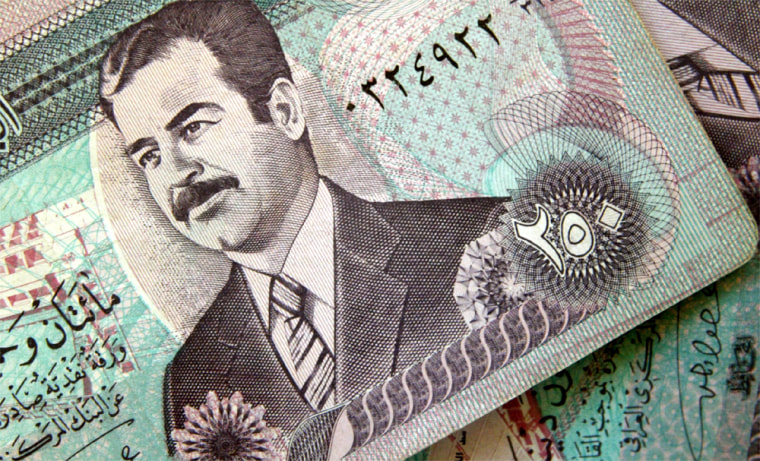Bank notes printed with the face of Saddam Hussein ceased to be legal tender in Iraq on Thursday, as the new currency soared to fresh highs against the dollar, forcing the Central Bank of Iraq to step in.
People lined up in the central bank’s main business hall, lifting plastic bags full of old dinars onto the counter and exchanging them for the sharp new notes printed with Iraqi monuments, landscapes and history.
In the bank’s main counting room, rows of women in bright headscarves and gray overalls processed piles of old currency, counting, binding, piling and dipping the dog-eared notes in red ink to indicate they were ready to be burned.
Around a third of the old notes have been destroyed already, and the U.S. authorities in Iraq estimate it will take about two months to incinerate the remaining 6,000 tons.
After the close of business on Thursday, only Saddam-free notes will be legal tender in Iraq. Iraqis were given three months to exchange their old notes.
A sense that the currency is undervalued, its limited circulation compared with the open-ended printing of notes under Saddam, and hopes for a flood of new investment in Iraq’s reconstruction have helped strengthen the Iraqi dinar.
Currency traders say that for the first time since the end of major combat last April more Iraqis are holding on to the dinar as a savings vehicle after years of hoarding dollars.
The Central Bank of Iraq said it had intervened on Thursday to counter the dinar’s swift rise, buying dollars at 1,350 dinars each after the currency hit 1,100 on Wednesday -- from 1,500 last week and a low of 2,200 last year.
Dinar's strength 'not justified'
Iraqi Central Bank Governor Sinan Shibibi told reporters the strength was “not justified.”
“There’s probably some kind of speculation, people have bright prospects for the Iraqi economy...It is now a trustworthy currency, but it’s not justified because it’s a big jump, you really want something smooth,” he said.
The British Treasury’s Jacob Nell, a policy advisor in Iraq, said the central bank thought the appreciation of the dinar in the past week was unwarranted by any political or economic development.
“Today (the bank) bought dollars in the auction at 1,350 and it stands ready to intervene further in order to ensure it meets its primary objective of exchange rate stability,” Nell said.
Bank officials say the new currency is symbolically important, but also stress it is less prone to counterfeiting.
Nell said less than 1.5 percent of old notes were forged, but a widespread belief more notes were fake had been damaging.
In the streetside money markets, currency vendors were at a loss to explain the dinar’s recent volatility. There are rumors of interference from outside, of Kuwaitis or Jordanians trying to play the markets and line their pockets.
Money changer Abbas Feilih sat between the puddles and exhaust fumes of Baghdad’s Firdous Square, a calculator and a pile of bright new notes sitting on his wooden table.
“I don’t really understand why it’s changing so much,” he said. “Yesterday 1,100, today 1,300...It’s not clear why, maybe there are people outside our borders playing around. But people seem to think the economy will get better, that’s a good thing.”
